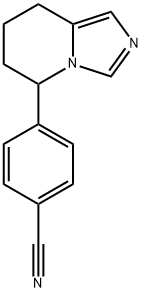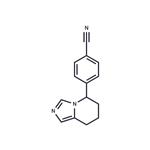Fadrozole hydrochloride is able to inhibit the aromatase-mediated androstenedione-induced uterine hypertrophy in immature female rats with an ED50 of 0.03 mg/kg when given orally. In the same model, aminoglutethimide elicits the same effect with an ED50 of 30 mg/kg when given orally[1]. Fadrozole hydrochloride prevents the development of both benign and malignant spontaneus mammary neoplasns in female Sprague-Dawley rats. It also slows the spontaneous development of ptuitary pars dta mas in female rats, and reduces the of spontaneous hcu ar tumours in male and female rats[2]. Administration of fadrozole in male and female mice suppresses the production of 17b-estradiol, accompanied with a 70% reduction in parasite burden. This protective effect is associated in male mice with a recovery of the specific cellular immune response. Interleukin-6 (IL-6) serum levels, and its production by splenocytes, is augmented by 80%, together with a 10-fold increase in its expression in testes of infected male mice. Fadrozole treatment returns these levels to baseline values[3].





